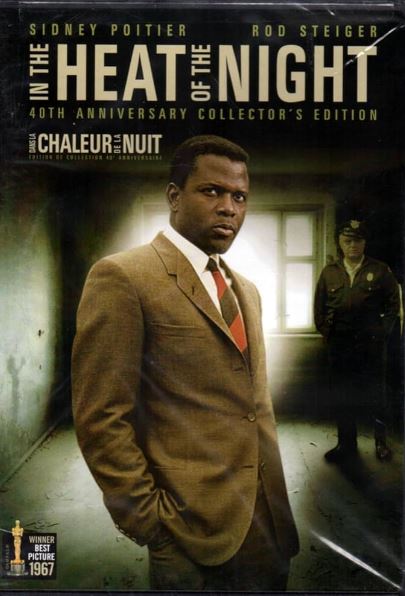The movie “In the Heat of the Night” managed to surpass memorable films released in the same year, 1967, such as “The Graduate” and “Bonnie and Clyde”, winning not only the Academy Award for Best Picture but also awards in four other categories including Adapted Screenplay and Film Editing.
The 1960s in America were a time when President John F. Kennedy proposed the Civil Rights Act of 1964, which aimed to outlaw racial discrimination, and Martin Luther King Jr. was leading the civil rights movement. However, it seems that changing people’s habit of discriminating against others wasn’t so easy. President John F. Kennedy was assassinated in November 1963, and Martin Luther King Jr. was assassinated in April 1968.
“In the Heat of the Night” winning the Academy Award for Best Picture over its competitors can’t be seen as unrelated to the overall social atmosphere in the US at the time.
The following is a scene where a white police chief meets a black detective.
Chief Gillespie: “Virgil, that’s a funny name for a nigger boy to come from Philadelphia. What do they call you up there?”
Virgil Tibbs: “They call me Mister Tibbs.”
Chief Gillespie: “Mr. Tibbs! Well Mr. Woods take Mr. Tibbs! Take him down to the depot and I mean boy like now!”
When the verb “call” is used with two nouns, it expresses the idea of naming or identifying someone as something else. This construction, exemplified by the phrase “They call me Mister Tibbs!” from the movie, is known as the fifth sentence pattern in English grammar. Here’s how we can break down this sentence structure and its formula for word order:
Subject (S) + Verb (V) + Object (O) + Object Complement (O.C)
In this formula, the Subject is the one performing the action (verb), the Object is the person or thing receiving the action, and the Object Complement gives more information about the Object, often naming or describing it.
In simpler terms, the fifth pattern uses what we call linking verbs. These verbs need not just an object but also something extra, known as an object complement, to fully explain or describe the object. It’s like saying the verb isn’t satisfied with just an object; it wants more details to give a full picture. So, these verbs always bring along an object complement. A handy way to grasp this concept is by thinking of the object and its complement as two pieces that fit together perfectly, completing the verb’s meaning. Essentially, you can think of it as ‘object equals object complement’ to understand their relationship better.
To simplify, let’s break down the sentence “They call me Mr. Tibbs” into two sentences: “They call me. I am Mr. Tibbs.” In summary, Mr. Tibbs is a word that appears to describe the object, me. The object me’s name is Tibbs, meaning Tibbs is the complement to me. Consider the following dialogue from Forrest Gump, where Forrest’s girlfriend Jenny expresses her desire to run away from home as a child.
Young Jenny Curran: “Dear God, make me a bird. So I could fly far. Far far away from here.” <Forrest Gump>
Perhaps all the explained grammar and terminology might be unnecessary. Simply think of English as written by resolving curiosity through the order we’ve organized. And it can be intuitively understood according to our word order formula.
S + V + (Who + What) + [Where + Why + How + When]
When young Jenny says “Dear God, make me a bird” in the example, she’s not asking for a bird to be made for her. Instead, she’s expressing a wish to be transformed into a bird herself. In this case, “a bird” serves as what completes or explains the object in the sentence. Conversely, if you say, “Dear God, make me an offer I can’t refuse,” it suggests asking someone to do something specific for you. So, the meaning of English sentences can shift based on how the words are arranged and the context surrounding them. Similar to how we use the verb “call,” there are other verbs typically used to express the idea of considering or naming someone or something as something else, like appoint, select, name, elect, and so on.
Colonel Walter Kurtz: “They call me an assassin. What do you call it when the assassins accuse the assassin? We lie, we lie, and we must be merciful to those who lie.” Apocalypse Now 1979)
Let’s look at the use of the verb “consider” to express “to regard someone as something.” Without the need for prepositions or any additional help, just by listing nouns, you can say, “I consider myself a lucky person.” It’s just a matter of arranging the words…
LOU GEHRIG: “Today, I consider myself the luckiest man on the face of the earth.” <THE PRIDE OF THE YANKEES>
However, it’s important to note that not all verbs can be used this way, which adds a bit of complexity to English. For example, you can’t use the verb “think” to create a sentence meaning “to consider/think of ~ as ~” just by listing nouns. In such cases, you inevitably need to use what corresponds to ‘particles’ in Korean, which are ‘prepositions’ in English. For expressing a role or function, the preposition ‘as’ is necessary.
JOHN WADE PRENTICE: “You think of yourself as a colored man. I think of myself as a man.” <GUESS WHO’S COMING TO DINNER, 1967>


답글 남기기